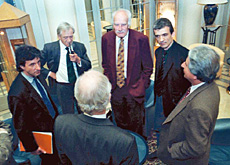Nazi Holocaust archives finally opened

The International Tracing Service, an arm of the Swiss-run International Committee of the Red Cross (ICRC), will finally release files from a Nazi-era archive.
Under an agreement reached on Tuesday, Holocaust institutions will be able to access in a few months’ time copies of data locked away in a quiet German town for more than 50 years.
The documents will give historians an intimate inside view of the Nazi machinery of oppression and death, and will let survivors and victims’ families search for their own histories – as recorded by the Germans.
The 11-nation governing body of the tracing service, which overees the archive in Bad Arolsen, Germany, voted to sidestep legalities and begin distributing electronic copies to the member states as soon as they are ready.
The decision circumvents the requirement to withhold the documents until all 11 countries ratify the 2006 treaty amendments that enabled the unsealing of the archive, and was likely to shave several months from the distribution timetable.
But institutions that receive the copies can only use the time to organize the electronic files and integrate them into their own archival systems.
They are prohibited from allowing access to researchers until the ratification process is complete, according to the archive’s Swiss director, Reto Meister.
Satisfaction
Yad Vashem, Israel’s Holocaust memorial in Jerusalem, which sent a representative to the meeting, welcomed the decision. “I am delighted to see this project moving forward,” said memorial director Avner Shalev.
“This was a huge hurdle for many people” on the commission, said J. Christian Kennedy, the United States State Department’s special envoy for Holocaust issues. He said the US government would do all it could to ensure the final four countries ratify the accord as soon as possible.
Italy, Greece, Luxembourg and France have all pledged to endorse the agreement by the autumn, Meister said. The United States, Israel, Britain, the Netherlands, Belgium, Poland and Germany have finished the legal process.
Meister said the first ten million pages – about one-fifth of the documents – would be ready for transfer by early September, and another huge batch in November.
Vast archive
The archive contains Nazi records on the arrest, transportation, incarceration, forced labour and deaths of millions of people from the year the Nazis built their first concentration camp in 1933 to the end of the war in May 1945. It also has a vast collection of post-war records from displaced persons camps.
The name index refers to 17.5 million victims, and the documents fill 25 linear kilometres of shelves. Until now, the files have been used to track missing people, reunite families, and later to validate restitution claims.
Seized by the Allies after the war, the files were closed under a 1955 agreement to protect the privacy of survivors and the reputation of the dead who may have undergone humiliating medical experiments or been falsely accused of crimes.
Few people were allowed to see the actual papers. Since 1955, the archive has received more than 11 million requests for information, but has often responded with form letters giving minimal information. Sometimes, copies of documents were given to families.
Meister, who began working for the ICRC in 1982 and took over as head of the service late last year, said that approach is changing.
“People have the right to see their files. They may be written by the Gestapo. Ultimately, this is the property of the person whose name appears there,” he added.
swissinfo with agencies

More
International Committee of the Red Cross
The International Tracing Service is under the supervision of an international commission and under the direction of the ICRC since 1954.
The commission members come from 11 states: Belgium, France, Germany, Greece, Israel, Italy, Luxembourg, the Netherlands, Poland, Britain and the United States.
The ICRC appoints a Swiss citizen as director.
Beside help to find missing people, the service has also been used to validate compensation claims.
After Germany and German industries agreed in 2000 to pay indemnities for forced labour, the service handled 190,000 inquiries within 18 months.

In compliance with the JTI standards
More: SWI swissinfo.ch certified by the Journalism Trust Initiative










You can find an overview of ongoing debates with our journalists here . Please join us!
If you want to start a conversation about a topic raised in this article or want to report factual errors, email us at english@swissinfo.ch.